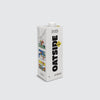
When Gonzalo Hernandez was a young child, he was caught on multiple occasion for stealing a sip of coffee from the adults' table. In an attempt to discourage him from doing so, his mother tried putting salt in the coffee cups, but this did not impede Gonzalo from his attempts!
This was what stirred Gonzalo’s curiosity in coffee and how in 2003, he founded Coffea Diversa, the world’s largest private collection of rare coffee botanical variants.
In this interview series we speak with Gonzalo Hernandez on how this curiosity eventually led him to begin this life-long relationship with specialty coffee.
Q: With a large portfolio like yours, how do you determine what’s good and what’s not good?
Quality is relative. When we started producing, we sent different samples to companies. What was strange was the difference in preferences. Taste is personal and what I look for is the same feeling when we taste an interesting coffee for the first time, again.
Q: The coffee varieties that you planted are often not planted commercially, why?
Coffee production typically focuses on productivity and yield. They look for a plant that can produce a large amount of coffee. To put it simply: a strong plant that is not affected badly by pests or diseases.
The criteria for coffee trees that farmers look for is a high yielder. Typically, the most commonly planted is the Bourbon and Typica varietal. Then someone found a natural mutation in Brazil in a Bourbon varietal coffee plantation. He embraces the Caturra because of the yield.
All this explanation is to let you know that farmers traditionally have focused on yield, while most coffee plants that I choose to plant are of poor yield, and small quantities. These varietals have never been "interesting" for coffee farmers (because of their poor yield). The Agricultural Coffee Research Centre has a range of collections on a much larger scale, but it was never released because they knew no one would embrace it.
Q: How did you decide to embrace the rare, poor yields, small quantities coffee plants?
Our most important factor is the taste profile. Yield is secondary. I want to share a different taste profile to the coffee lovers than what we already have. Our approach is to always look for something different. With diversity, there will always be something for everyone.
Q: What are some of the challenges running a private collection coffee garden compared to a commercial coffee farm production?
Details. Typically, a farm does everything as a whole lot. In our case, we have to do everything separately. We have to be very careful and organised, so that it remains pure.
One of the biggest challenges we have to face is to be organised. But it gets even more complicated as the botanical variant is only one variable. Once we have the coffee cherries, we process it in three different methods. Sometimes, one botanical variant can be processed in five different ways, e.g. natural, semi-washed, washed etc, but we just do it. The coffee roasters that we work with embraces diversity too. They enjoy exploring and being out of their comfort zones.
Q: How do you curate which rare and exotic coffee to grow?
To me, it’s like all these botanica variants are like my daughters, I look at them as persons. They have different personalities, different tastes, and I love them all. You can plant 3,000 trees and there's no cookie cutter answers. Everything is different. But I do look out for interesting coffee plants to grow, and with that being said, 3 years ago we started producing Specialty Liberica.
Catch our live interview with Gonzalo in Episode 13 of Coffee On on YouTube. For more, follow PPP Coffee on Instagram.









